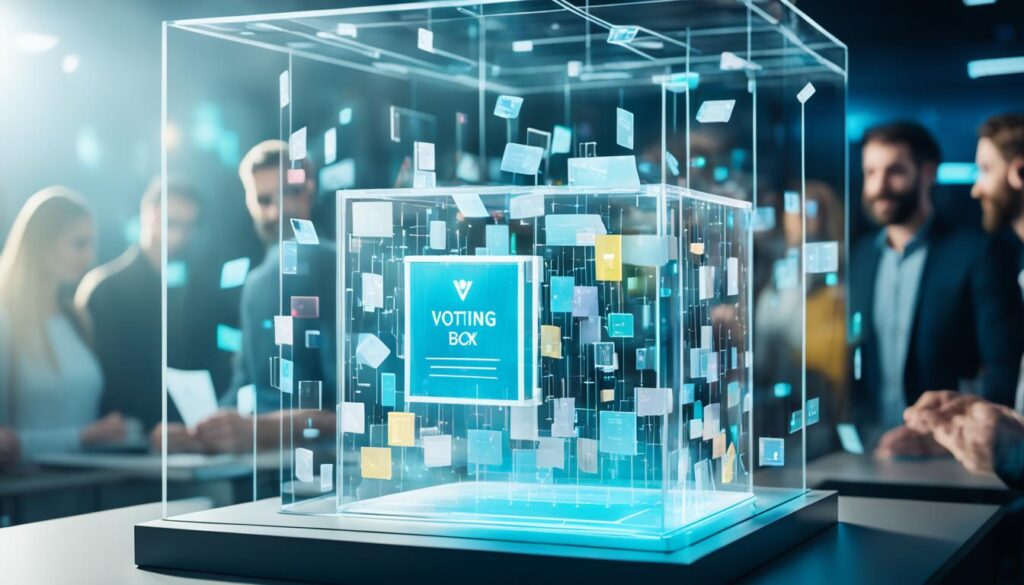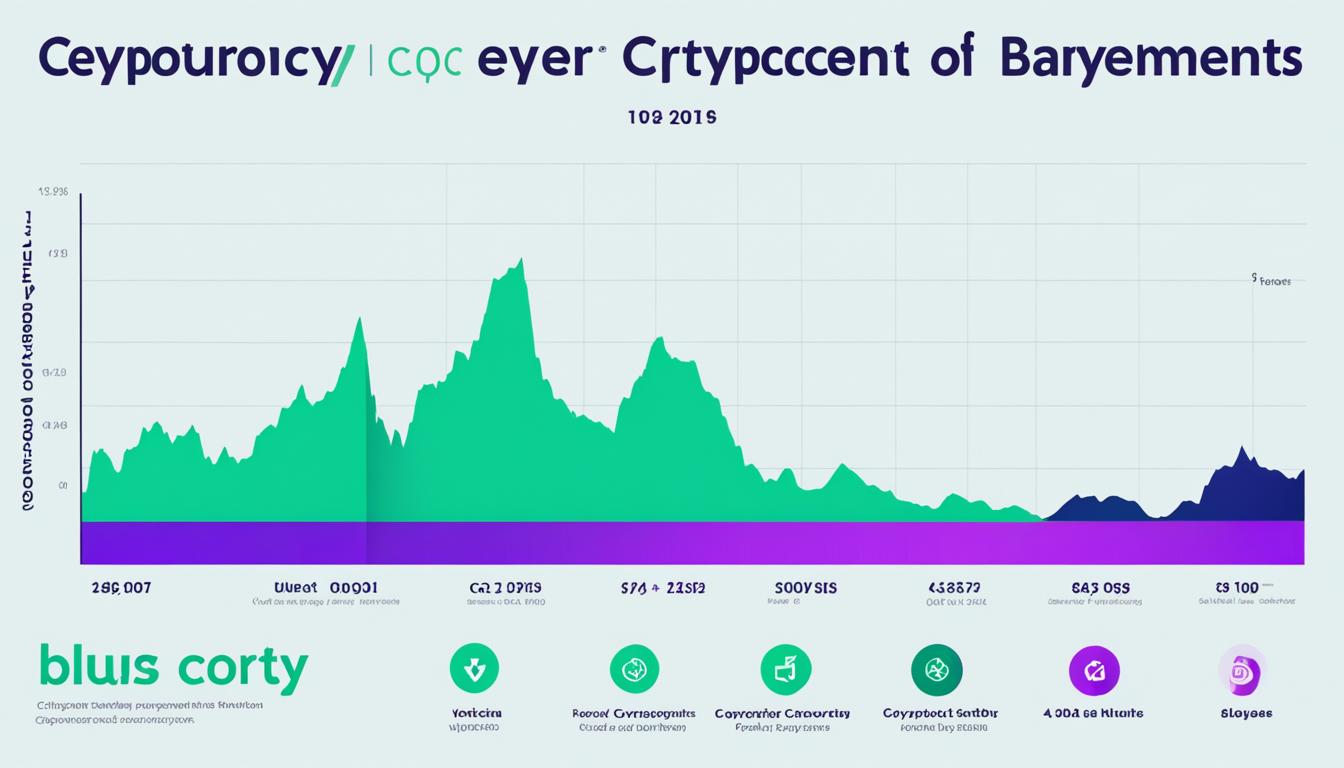Did you know that over 2 billion people around the world participate in various democratic processes each year? Whether it’s national elections, local referendums, or community decision-making, voting is a fundamental pillar of democracy. However, this critical process is not without its challenges.
In recent times, concerns regarding the security and integrity of the voting process have been growing. From tampering with electronic voting machines to voter fraud and hacking attempts, the need for a secure voting system has never been more pressing.
Enter blockchain technology.
Blockchain, the same technology that powers cryptocurrencies like Bitcoin, is revolutionizing the voting process by providing a secure and tamper-proof platform. With its decentralized and transparent nature, blockchain ensures voting integrity and offers a solution to many of the existing challenges.
Contents
- 1 Enhancing Security through Blockchain in Voting
- 2 Ensuring Transparency with Decentralized Voting
- 3 Safeguarding the Integrity of the Electoral Process
- 4 Overcoming Challenges and Adoption of Blockchain in Voting
- 5 Challenges and Solutions in Adopting Blockchain in Voting
- 6 Conclusion
- 7 FAQ
- 7.1 How does blockchain technology enhance the security of the voting process?
- 7.2 What are blockchain voting platforms?
- 7.3 How does blockchain technology ensure transparency in the electoral process?
- 7.4 How do blockchain voting solutions preserve the integrity of each vote?
- 7.5 What are the challenges associated with adopting blockchain in voting?
Key Takeaways:
- Blockchain technology is transforming the voting process by providing a secure and tamper-proof platform.
- Concerns regarding the security and integrity of the voting process have prompted the need for a more secure voting system.
- Blockchain’s decentralized and transparent nature enhances voting integrity and addresses existing challenges.
- Over 2 billion people participate in democratic processes worldwide each year.
- The transformative potential of blockchain technology in voting is immense.
Enhancing Security through Blockchain in Voting
In order to ensure a secure voting system, leveraging blockchain technology has become increasingly crucial. The use of a blockchain voting platform offers numerous features that enhance the overall security of the voting process, protecting the integrity of electronic voting. With electronic voting security measures in place, blockchain technology provides a reliable and tamper-proof solution for elections.
One of the key advantages of a secure voting system powered by blockchain is the immutability of the data. Each vote is recorded and stored on the blockchain, creating an indelible record that cannot be altered or tampered with. This eliminates the risk of fraudulent activities and ensures the accuracy of the voting results.
Features of a Secure Voting System with Blockchain
A blockchain voting platform offers several features that enhance security:
- Decentralization: By utilizing a decentralized network of nodes, a blockchain-based voting system distributes the storage and processing of data across multiple entities. This eliminates the risk of a single point of failure or manipulation, making it extremely difficult for hackers or malicious actors to compromise the integrity of the voting process.
- Transparency: Blockchain technology enables transparent and auditable voting. Each vote is recorded on the blockchain, allowing participants to independently verify the authenticity of the vote. This transparency increases trust and confidence in the electoral process.
- Encryption: Electronic voting security measures, such as encryption, are employed to protect the privacy and confidentiality of voters’ identities and choices. By using advanced cryptographic techniques, blockchain-based voting platforms ensure that only authorized participants can access and view the encrypted data.
- Smart Contracts: Smart contracts, self-executing agreements recorded on the blockchain, can be utilized to automate various aspects of the voting process. This reduces the reliance on intermediaries, minimizing the risk of human error or manipulation.
By leveraging these features, a secure voting system powered by blockchain technology can significantly enhance the security and integrity of the electoral process. It provides a robust framework that protects against tampering, manipulation, and unauthorized access, ensuring that each vote is accurately recorded and counted.
Ensuring Transparency with Decentralized Voting
Blockchain technology has revolutionized the voting process by enabling decentralized voting and ensuring transparency in the electoral process. With the use of transparent voting technology and blockchain voting solutions, every vote can now be verifiable and transparent, fostering trust and integrity in elections.
A decentralized voting system eliminates the need for a central authority to oversee the entire voting process. Instead, it distributes the voting power among multiple nodes or participants, making it more resistant to manipulation or fraud. By removing the dependence on a single entity, decentralized voting enhances transparency and reduces the potential for corruption.
Transparent voting technology plays a vital role in ensuring the integrity of the electoral process. It allows voters to independently verify their vote and confirm that it has been recorded accurately. The transparent nature of blockchain technology ensures that every vote is securely stored and tamper-proof, providing an immutable record of the entire voting process.
Blockchain voting solutions utilize the power of blockchain technology to create a secure and transparent voting environment. These solutions leverage the inherent features of blockchain, such as decentralization, cryptography, and consensus mechanisms, to safeguard the integrity of the voting process.
The Role of Transparency in Decentralized Voting
Transparency is a key attribute of decentralized voting. It enables voters, candidates, and other stakeholders to have full visibility into the voting process, promoting trust and ensuring that the results accurately reflect the will of the people. By making the entire voting process transparent, blockchain technology eliminates doubts or skepticism surrounding the integrity of elections.
Transparency in decentralized voting is essential to address concerns about voter fraud, coercion, or manipulation. It empowers individuals to verify the authenticity of their vote and helps detect any irregularities or attempts at tampering with the results.
Moreover, transparent voting technology allows for increased accountability and auditability. Each step of the voting process, from voter registration to tabulation of results, can be traced and audited, providing a level of scrutiny that was not possible with traditional voting systems.
The integration of blockchain into the voting process ensures a level of transparency that was previously unattainable. Each vote is recorded on the blockchain, creating an immutable and auditable trail of the entire electoral process. This transparency instills confidence in the electoral system and strengthens the democratic principles that underpin free and fair elections.

The use of transparent voting technology and blockchain voting solutions is transforming the way we conduct elections. By ensuring decentralized voting and transparency, blockchain technology is revolutionizing the electoral process, enhancing public trust, and strengthening democracy.
Safeguarding the Integrity of the Electoral Process
In today’s digital age, ensuring the integrity of the electoral process is of paramount importance. With increasing concerns about election security and the need for transparent and trustworthy voting systems, blockchain technology has emerged as a powerful solution. By leveraging blockchain in voting, we can establish a secure voting system that safeguards the integrity of elections and enhances democratic participation.
One of the key advantages of using blockchain in voting is its ability to create a secure voting system. Voting integrity is crucial for maintaining public trust in the electoral process. Traditional voting systems often face challenges such as hacking, manipulation, and fraud. However, by implementing a secure voting system powered by blockchain, these concerns can be addressed effectively.
A blockchain-based voting system ensures the security and immutability of voter data. Each vote is recorded on a decentralized and distributed ledger, making it virtually impossible for any unauthorized party to modify or tamper with the voting records. This transparency and secure voting system act as a robust defense against fraudulent activities and enhance the credibility of the electoral process.
Decentralized voting is another key aspect that contributes to the integrity of the electoral process. Decentralized voting mechanisms help eliminate central authorities and intermediaries, reducing the chances of manipulation or corruption. With blockchain technology, each vote is independently verified by multiple nodes in the network, ensuring the accuracy and transparency of the entire process.
Furthermore, blockchain technology enables the use of unique cryptographic identifiers for voters, protecting their privacy while ensuring the integrity of the voting process. These identifiers prevent duplicate voting and enhance the overall security of the electoral process.
By combining a secure voting system and decentralized voting mechanisms, blockchain technology offers a comprehensive solution to safeguard the integrity of the electoral process. It provides voters with transparency, ensures the accuracy of the results, and enhances public trust in the democratic system.

As governments and organizations around the world recognize the importance of secure and transparent elections, many are exploring the adoption of blockchain in voting. The potential benefits of this technology extend beyond enhanced security and integrity. Blockchain-based voting systems can also streamline the voting process, reduce costs, and increase accessibility, ultimately improving democratic participation.
With its ability to enhance voting integrity, establish a secure voting system, and enable decentralized voting mechanisms, blockchain technology is revolutionizing the electoral process. Embracing this transformative technology ensures a future in which trust, transparency, and democracy go hand in hand.
Overcoming Challenges and Adoption of Blockchain in Voting
While blockchain technology holds immense potential for revolutionizing the voting process, there are several challenges that need to be addressed for its widespread adoption. It is crucial to understand and overcome these challenges to build a secure and efficient voting system.
Ensuring Trust and Acceptance
One of the key challenges in adopting blockchain in voting is gaining trust and acceptance from various stakeholders. Convincing voters, election officials, and government bodies about the effectiveness and reliability of a blockchain-based voting system is essential. Transparent communication and education about the benefits of this secure voting system are vital in building trust and driving adoption.
Addressing Technical Limitations
Blockchain technology, while promising, also faces technical limitations. Scalability and speed are key concerns when it comes to implementing a blockchain-based voting system on a large scale. As the number of votes increases, the blockchain can become slower and less efficient. Efforts are being made to overcome these limitations through the development of innovative solutions such as sharding and layer-two protocols.
Ensuring Voter Privacy
Protecting voter privacy is a fundamental aspect of any voting system. Blockchain in voting presents unique challenges in this regard. While the blockchain itself is transparent and immutable, ensuring the confidentiality of individual votes is crucial. Solutions such as zero-knowledge proofs and advanced encryption techniques are being explored to strike a balance between transparency and voter privacy.

Legal and Regulatory Framework
The adoption of blockchain in voting requires the establishment of a clear legal and regulatory framework. It is essential to define the legal status of blockchain-based voting systems and address concerns related to jurisdiction, governance, and compliance. Collaboration between policymakers, legal experts, and technologists is necessary to create a comprehensive framework that supports the secure implementation of this technology.
User Accessibility and Adoption
For blockchain in voting to be successful, it must be accessible to all voters, regardless of their technical expertise. User-friendly interfaces and intuitive platforms will play a crucial role in ensuring widespread adoption. Efforts should be made to address the digital divide, provide equitable access to technology, and prioritize inclusivity in the design of blockchain-based voting systems.
Current State of Adoption
The adoption of blockchain technology in the voting sector is still in its early stages. However, several pilot projects and initiatives are underway to explore its potential. Countries like Estonia have already implemented blockchain-based voting systems, demonstrating the feasibility and benefits of this technology. Continued research, development, and collaboration will be essential to drive wider adoption and ensure the integrity and security of electoral processes.
Challenges and Solutions in Adopting Blockchain in Voting
| Challenges | Solutions |
|---|---|
| Gaining trust and acceptance | Transparent communication and education |
| Addressing technical limitations | Scalability solutions, sharding, and layer-two protocols |
| Ensuring voter privacy | Zero-knowledge proofs and advanced encryption techniques |
| Legal and regulatory framework | Establishment of clear guidelines and collaboration |
| User accessibility and adoption | User-friendly interfaces and inclusivity |
Conclusion
After exploring the transformative potential of blockchain technology in the voting process, it is evident that it offers a secure, transparent, and tamper-proof solution. By leveraging blockchain in voting, we can create a secure voting system that enhances democratic participation and safeguards the integrity of elections.
The use of blockchain technology ensures the integrity of each vote, providing an incorruptible ledger that cannot be manipulated. It eliminates the risk of fraud and tampering, giving voters confidence in the electoral process. With a decentralized voting system, power is distributed among multiple nodes, reducing the risk of a single point of failure and increasing trust in the outcome.
In addition to security and transparency, blockchain in voting also enhances accessibility. Thanks to its decentralized nature, voting can be conducted remotely, enabling individuals from all corners of the country to participate in the electoral process. This inclusivity promotes a more equitable and representative democracy.
In conclusion, blockchain technology has the potential to revolutionize the voting process by offering a secure, transparent, and accessible solution. By adopting blockchain in voting, we can create a system that ensures the integrity of each vote, promotes democratic participation, and strengthens the foundations of our democratic society.









Leave a Reply